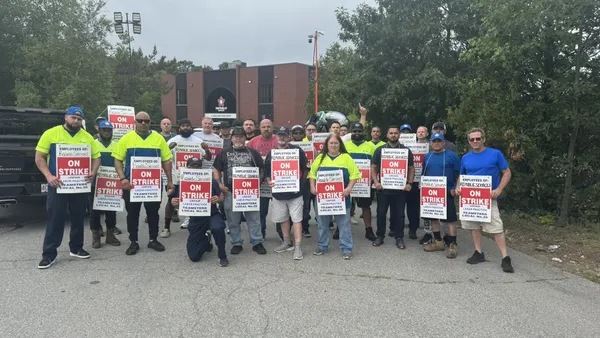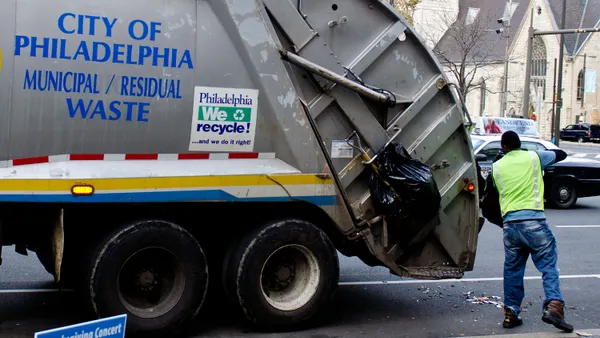Dive Brief:
- Sweeping national plastics legislation could be inching closer to reality after two lawmakers debuted a draft bill this month. The effort would codify into federal law both extended producer responsibility (EPR) and a national "bottle bill" in the form of a 10-cent container deposit system. Certain lightweight products, including carryout plastic bags, disposable foodware made from expanded polystyrene, cotton buds, and straws would be banned from sale and distribution as of January 2022, with some exceptions for people with disabilities.
- Revenue generated from a fee on non-reusable carryout plastic bags would also go toward recycling infrastructure and litter clean-up projects. In one potentially controversial measure, the bill calls for a moratorium on new plastics facilities, giving environmental agencies leeway to consider impacts on air, water and climate in assessing those sites. The bill would also update Environmental Protection Agency (EPA) regulations to reduce plastic contamination in waterways.
- The draft comes amid a push by beverage industry giants to capture more PET bottles through a new $100 million initiative, which has been presented as an alternative to federal legislation. But the proposed bill could gain momentum, especially given growing concerns about plastic pollution and increasing pressure to act. Jan Dell, an independent engineer with the Last Beach Cleanup, told Waste Dive the draft provisions "are cost-effective and proven approaches for reducing plastic pollution."
Dive Insight:
Authored by Sen. Tom Udall of New Mexico and Rep. Alan Lowenthal of California, the bill is seen as the first of this magnitude in many years, with major implications for the waste and recycling industry. Big players like the National Waste and Recycling Association (NWRA) criticized the initial outline of the legislation when it was released in August, arguing that it would increase contamination and put too much pressure on MRF infrastructure.
Under the draft bill, plastics producers would be required to take responsibility for collecting and recycling materials. They would be encouraged to implement cleanup programs with EPA approval, in addition to covering the costs of waste management. This EPR plan would come coupled with a number of other measures, including a nationwide container deposit requirement, regardless of material. The 10 states that already have bottle bills would be allowed to continue their programs if they meet federal requirements.
Heidi Sanborn, executive director for the National Stewardship Action Council, told Waste Dive that the bill is a "game changer" with positive implications for public health and the environment.
"This is truly the circular economy, when the producer is held responsible for what they're putting on the market," Sanborn said.
Dell offered similar sentiments, emphasizing the national container deposit component in particular, which she said would create "a clean stream of PET bottles" that the beverage industry has repeatedly said it wants to use again.
But it is unclear whether the legislation will see any support from major industry players who have historically sought to undermine bottle bills and regulatory efforts. Last week, the Coca-Cola Company, Keurig Dr Pepper, and PepsiCo announced a $100 million initiative with the World Wildlife Fund to capture more PET bottles. Udall and Lowenthal released a joint statement in response, arguing that pledges need to be backed up by "real, concrete action."
The Recycling Partnership – a participant in the bottle initiative, with its own future policy ambitions – declined to give a statement on the draft legislation at this time.
NWRA did not return Waste Dive's request for comment. CEO Darrell Smith previously wrote to Lowenthal and Udall that they should focus on expanding national recycling infrastructure in lieu of their other policy aims.
When the bill's language first circulated, the American Chemistry Council said the association "looked forward to working with Congress" on legislation, while pushing back on banning certain plastics and arguing such measures would exacerbate greenhouse gas emissions. The Plastics Industry Association has offered similar sentiments.
Those supporting the draft bill indicated they anticipate there will be resistance from various industry players. Sanborn said she believes there will be an "epic fight" over the legislation, but that growing public concern over plastics pollution and climate change could give proponents some momentum. Recent research shows plastics are associated with significant carbon emissions.
The comment period on the bill closes on Nov. 21, building on an initial request for input that generated over 150 responses. After the second comment phase ends, the lawmakers intend to introduce the bill in Congress.









